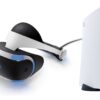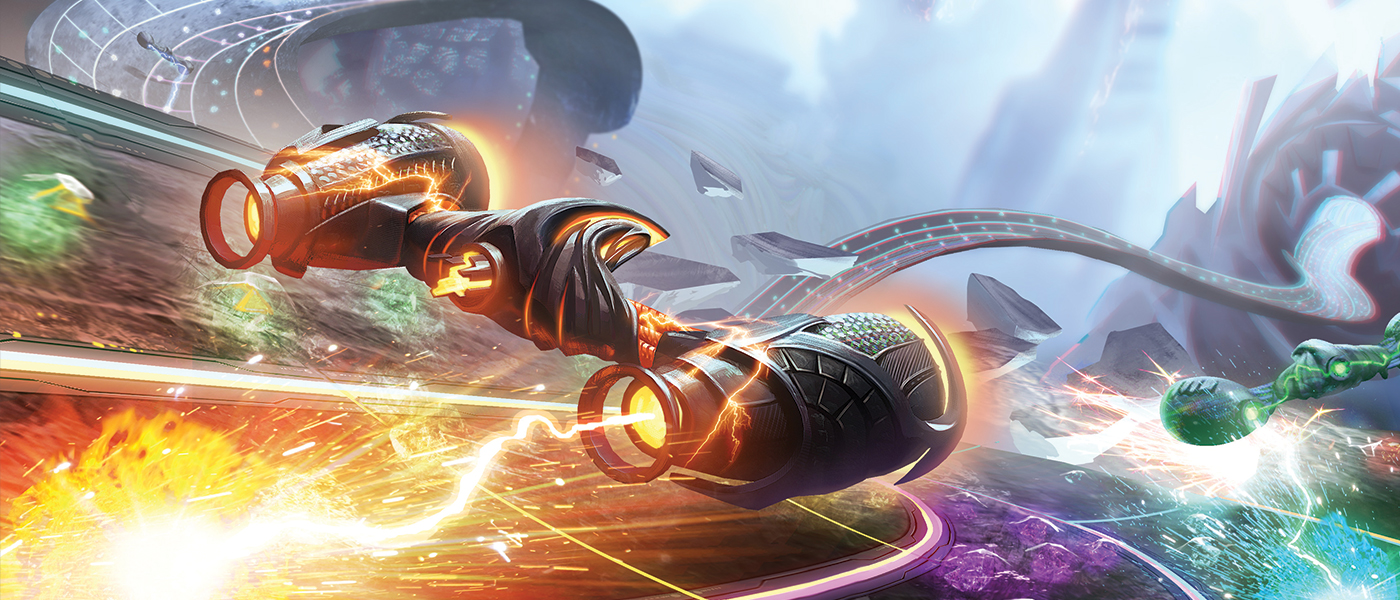 At first glance you could compare the visuals of Amplitude to those of the Audiosurf games on PC, but there’s a lot more going on when it comes to its design. Amplitude’s narrative is set within the human brain, where the player vehicle travels throughout the various cerebral cortexes in order to repair brain function. Within the reality of Amplitude, the inside of our brain is showcased is showcased by a large array of psychedelic and abstract visuals that are showcased with a wide range of color and light.
At first glance you could compare the visuals of Amplitude to those of the Audiosurf games on PC, but there’s a lot more going on when it comes to its design. Amplitude’s narrative is set within the human brain, where the player vehicle travels throughout the various cerebral cortexes in order to repair brain function. Within the reality of Amplitude, the inside of our brain is showcased is showcased by a large array of psychedelic and abstract visuals that are showcased with a wide range of color and light. There isn’t much negative to say on the game’s behalf, considering its visual presentation relies on such a solid case of art design, which effectively enhances the gameplay experience. You’d expect to focus more on the main highway of gameplay, but as you look towards your next section of notes you might find yourself a little bit distracted by your surroundings, which in this case is more of a compliment rather than a concrete issue, considering that effect will most likely vary greatly between different players.
There isn’t much negative to say on the game’s behalf, considering its visual presentation relies on such a solid case of art design, which effectively enhances the gameplay experience. You’d expect to focus more on the main highway of gameplay, but as you look towards your next section of notes you might find yourself a little bit distracted by your surroundings, which in this case is more of a compliment rather than a concrete issue, considering that effect will most likely vary greatly between different players.
 Amplitude’s base of gameplay isn’t exactly new, which isn’t that surprising considering the fact that it’s a spiritual remake of Frequency and the original Amplitude, but in its throwbacks an issue comes forward : is being too similar an issue despite its appeal?
Amplitude’s base of gameplay isn’t exactly new, which isn’t that surprising considering the fact that it’s a spiritual remake of Frequency and the original Amplitude, but in its throwbacks an issue comes forward : is being too similar an issue despite its appeal?
The base of gameplay is pretty straightforward. Much like other rhythm games you press the corresponding buttons to the notes on the highway, but in this instance you’ll constantly be switching through multiple highways which are each linked to their corresponding instrument. For players unfamiliar with the original, you could compare the gameplay to Rock Band Blitz, which has a similar setup. But what sets Amplitude apart? Well, basically nothing to be honest. With a great sense of difficulty and fluidity, the core gameplay of the game is as well executed as you could hope, but at the same time there’s a great sense that the developer simply spent too much time creating an identical experience, which in essence isn’t that big of an issue, were it not be for the fact that Amplitude’s setlist keeps its strengths from shining. The game consists of roughly 30 songs, but half of the selection is original material by Harmonix. Not to say that the material by Harmonix is bad in any way, because it isn’t, but accompanied by the licensed tracks the entire selection is quite limited when it comes to variety. This is mostly problematic due to the fact that the game ultimately relies on whether you’ll like it choice in genre, rather than providing a diverse variety of styles for players like most of Harmonix’s offerings in their other franchises.
But what sets Amplitude apart? Well, basically nothing to be honest. With a great sense of difficulty and fluidity, the core gameplay of the game is as well executed as you could hope, but at the same time there’s a great sense that the developer simply spent too much time creating an identical experience, which in essence isn’t that big of an issue, were it not be for the fact that Amplitude’s setlist keeps its strengths from shining. The game consists of roughly 30 songs, but half of the selection is original material by Harmonix. Not to say that the material by Harmonix is bad in any way, because it isn’t, but accompanied by the licensed tracks the entire selection is quite limited when it comes to variety. This is mostly problematic due to the fact that the game ultimately relies on whether you’ll like it choice in genre, rather than providing a diverse variety of styles for players like most of Harmonix’s offerings in their other franchises.
There’s also a catch regarding the tracklist, which is that most of the soundtrack is locked until you’ve played a certain amount of songs. With the limited selection, this seems like a rather questionable design choice, especially considering the fact that some songs require you to play 60 songs, which can be quite tiresome if you haven’t even unlocked all of the 31 songs included in the game. The lack of range within the track selection and the sheer amount of replaying required are two issues that ultimately confront each other in quite an annoying way, which is a shame considering the gameplay itself is otherwise quite solid and fun in retrospect. When it comes to a challenging experience Amplitude does have a lot in store for players. For newcomers to the style of gameplay the beginner setting will be most suitable to get a hang of the core mechanics, but succeeding in completing more energetic and difficult songs is often rewarding enough to make you eager to up your game and try out higher difficulties as you move along (which either showcases your skill or misplaced confidence that hits you in the face aftwards…) The game also offers local multiplayer and ‘Remix’ game modes, which throw some extra variety into the mix, albeit that the game is arguable best enjoyed in short bursts of gameplay, rather than extended sessions which may cause fatigue rather quickly.
When it comes to a challenging experience Amplitude does have a lot in store for players. For newcomers to the style of gameplay the beginner setting will be most suitable to get a hang of the core mechanics, but succeeding in completing more energetic and difficult songs is often rewarding enough to make you eager to up your game and try out higher difficulties as you move along (which either showcases your skill or misplaced confidence that hits you in the face aftwards…) The game also offers local multiplayer and ‘Remix’ game modes, which throw some extra variety into the mix, albeit that the game is arguable best enjoyed in short bursts of gameplay, rather than extended sessions which may cause fatigue rather quickly. Amplitude has the potential to be a great game, but the lack of innovation of the formula and the rather lackluster tracklist keep the game from ever being more than simply ‘okay’. For its retail price there’s a decent amount of content, but there is simply no incentive to invest a lot of time into it in a single session. Perhaps if Harmonix ever decides to expand upon the experience with DLC or a potential sequel Amplitude could be what it aspires to be, but until then the game could be classified as a nice callback for the fans.
Amplitude has the potential to be a great game, but the lack of innovation of the formula and the rather lackluster tracklist keep the game from ever being more than simply ‘okay’. For its retail price there’s a decent amount of content, but there is simply no incentive to invest a lot of time into it in a single session. Perhaps if Harmonix ever decides to expand upon the experience with DLC or a potential sequel Amplitude could be what it aspires to be, but until then the game could be classified as a nice callback for the fans.



